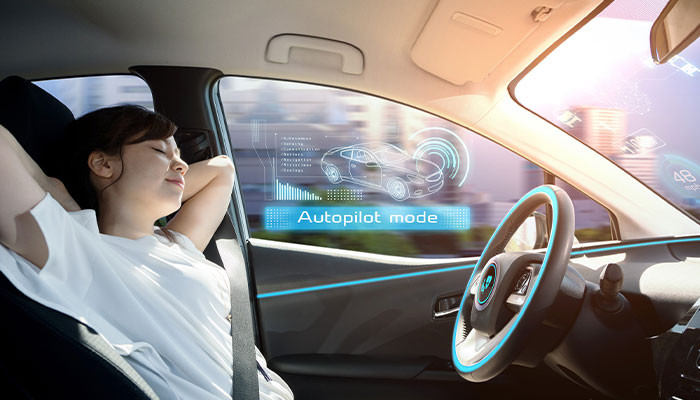The concept of driverless cars, also known as autonomous vehicles, has transitioned from science fiction to reality over the past decade. With rapid advancements in technology, we are closer than ever to seeing driverless cars on our roads. But are we truly ready for this transformation? As an online driver education provider, Get Drivers Ed is committed to preparing drivers for the future of transportation. In this blog, we'll explore the current state of driverless cars, the benefits and challenges they present, and what drivers ed can do to help us navigate this new era.
The Current State of Driverless Cars
Driverless cars are equipped with advanced sensors, cameras, and artificial intelligence (AI) systems that allow them to navigate roads, detect obstacles, and make driving decisions without human intervention. Companies like Tesla, Waymo, and Uber have been at the forefront of developing and testing autonomous vehicles, with varying levels of automation.
Levels of Automation.
The Society of Automotive Engineers (SAE) defines six levels of driving automation, from Level 0 (no automation) to Level 5 (full automation). Most current autonomous vehicles operate at Level 2 or Level 3, where the car can handle some driving tasks but still requires human supervision. Level 5 represents fully autonomous vehicles that can operate without any human input.
Testing and Deployment
Several cities around the world have allowed testing of driverless cars on public roads. These tests have provided valuable data on the performance and safety of autonomous vehicles. However, widespread deployment is still limited, with regulatory, technical, and public acceptance challenges to overcome.
Benefits of Driverless Cars
Driverless cars promise numerous benefits, from increased safety to reduced traffic congestion. Here are some key advantages:
Enhanced Safety
Human error is a leading cause of traffic accidents. Autonomous vehicles have the potential to significantly reduce accidents by eliminating human errors such as distracted driving, fatigue, and impaired driving. Advanced sensors and AI can react faster than humans, potentially preventing collisions.
Increased Accessibility
Driverless cars can provide mobility solutions for individuals who are unable to drive, such as the elderly, disabled, or those without a driver's license. This increased accessibility can improve the quality of life for many people.
Reduced Traffic Congestion
Autonomous vehicles can optimize traffic flow and reduce congestion through efficient routing and communication with other vehicles. This can lead to shorter travel times and lower emissions from idling vehicles.
Environmental Benefits
Many autonomous vehicles are electric, contributing to reduced greenhouse gas emissions and lower dependence on fossil fuels. Additionally, optimized driving patterns can enhance fuel efficiency for hybrid and traditional vehicles.
Economic Savings
Driverless cars can lead to economic savings by reducing the costs associated with accidents, such as medical expenses, vehicle repairs, and insurance premiums. They can also lower transportation costs for individuals and businesses.
Challenges of Driverless Cars
Despite the potential benefits, there are several challenges that must be addressed before driverless cars can become mainstream:
Technological Limitations
Autonomous vehicles rely on complex software and hardware systems that are still being refined. Issues such as sensor malfunctions, software bugs, and limitations in AI decision-making can impact the reliability and safety of driverless cars.
Regulatory and Legal Hurdles
Developing a regulatory framework for driverless cars is a complex task. Governments must establish safety standards, liability laws, and data privacy regulations. The lack of a unified approach can hinder the widespread adoption of autonomous vehicles.
Public Acceptance
Trust in technology is a significant barrier to the acceptance of driverless cars. Many people are skeptical about the safety and reliability of autonomous vehicles. Building public trust through education, transparency, and successful implementation is crucial.
Infrastructure Requirements
Driverless cars require advanced infrastructure, such as smart traffic signals, road sensors, and high-definition maps. Upgrading existing infrastructure to support autonomous vehicles is a significant financial and logistical challenge.
How Drivers Ed Can Prepare Us for the Future
As we move towards a future with driverless cars, drivers ed will play a crucial role in preparing individuals for this transition. At Get Drivers Ed, we are committed to incorporating the latest developments in autonomous vehicle technology into our curriculum. Here’s how drivers ed can help:
Education on Autonomous Technology
Understanding how driverless cars work and their capabilities is essential. Our drivers ed courses include modules on the basics of autonomous vehicle technology, the different levels of automation, and the benefits and challenges of driverless cars.
Safety Training
While autonomous vehicles can enhance safety, human drivers must still understand how to interact with them on the road. Drivers ed can teach students how to share the road with autonomous vehicles, including safe following distances and understanding vehicle signals.
Legal and Ethical Considerations
Navigating the legal and ethical implications of driverless cars is complex. Our courses cover topics such as liability in case of accidents, data privacy, and the ethical considerations of AI decision-making in autonomous vehicles.
Future-Ready Skills
Preparing for a future with driverless cars means staying updated with the latest advancements in technology. Get Drivers Ed ensures that our students are well-informed about emerging trends and equipped with the skills needed for a changing transportation landscape.
Conclusion: Embrace the Future with Get Drivers Ed
Driverless cars are set to revolutionize the way we travel, offering numerous benefits but also posing significant challenges. As we navigate this transition, it is crucial to stay informed and prepared. At Get Drivers Ed, we are dedicated to providing comprehensive education that prepares drivers for the future of transportation.
Are we ready for driverless cars? With the right knowledge and preparation, we can be. Enroll in our drivers ed course today to stay ahead of the curve and ensure you are equipped for the changes to come. Remember, a well-educated driver is a safe driver, and with Get Drivers Ed, you're in good hands. Drive smart, drive safe, and embrace the future of driving with Get Drivers Ed.

